Japan's Official Development Assistance White Paper 2005
Main Text > Part II ODA DISBURSEMENTS IN FISCAL YEAR 2004 > Chapter 2 Details and New Policies about Japan's ODA:Striving for Further ODA Reforms > Section 1. Major Activities in Fiscal Year 2004 > 2. Formulation of Sector-specific Initiatives
2. Formulation of Sector-specific Initiatives
In addition to the ODA Charter and the New Medium-Term ODA Policy, Japan has formulated several sector-specific initiatives in order to clarify and promote its sector-specific assistance policies. The initiatives formulated thus far include Basic Education for Growth Initiative ( BEGIN ), Women in Development ( WID ) Initiative, and Okinawa Infectious Diseases Initiative ( IDI ). In 2005 the following initiatives were launched: Initiative for Disaster Reduction through ODA in January, Initiative on Gender and Development ( GAD ) in March, and "Health and Development" Initiative in June. The following section will outline each of these initiatives.
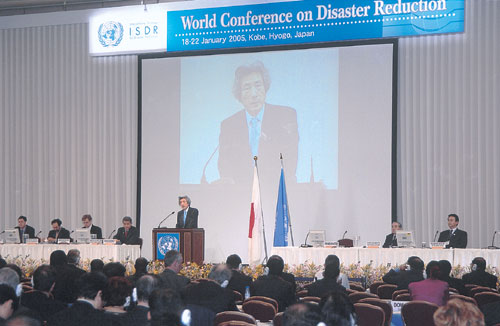
Prime Minister Koizumi delivering a speech as the host country at the World Conference on Disaster Reduction ( WCDR ) (Photo: Cabinet Office)
(1) Initiative for Disaster Reduction through ODA
The major earthquake off the coast of Sumatra, Indonesia and tsunami in the Indian Ocean that took place on December 26, 2004, which caused serious damage over large areas and revealed once again that wide-scale natural disasters can destroy people's lives and livelihood instantly. Japan has been playing an active role in the international cooperation on disaster prevention and reconstruction by utilizing its high capacity for disaster management acquired through its own experiences of numerous large-scale disasters. As for the recent earthquake and tsunami, Japan appealed to the international community by immediately announcing that it would offer assistance to the maximum extent in three ways: financial resources, knowledge and expertise, and human resources.
To further enhance such assistance in disaster prevention and reconstruction, Japan announced its "Initiative for Disaster Reduction through ODA" at the World Conference on Disaster Reduction ( WCDR ), which was held in Kobe, Hyogo Prefecture in January 2005. This Initiative illustrates Japan's basic policies concerning international cooperation on disaster reduction through ODA.
This Initiative emphasizes the importance of self-help efforts of developing countries and proposes comprehensive and coherent cooperation corresponding to each phase of disaster with an emphasis on disaster prevention. It lays out approaches to be taken to appropriately respond to various natural disasters, including earthquakes, floods and landslides, volcanic eruptions, and droughts. Based on this initiative, Japan will continue to actively provide effective cooperation in the future through dialogues with developing countries, making effective use of its own experiences, advanced expertise and technology. (See 3 of this Section for assistance regarding the major earthquake off the coast of Sumatra and the tsunami in the Indian Ocean, and 3 (6) of Section 2 for disaster prevention assistance.)
Box 2. Initiative for Disaster Reduction through ODA (Outline)
(2) Initiative on Gender and Development ( GAD ) 6
Japan announced its WID Initiative at the Fourth World Conference on Women, which was held in Beijing in 1995, and has been providing assistance that promotes the empowerment 7 of women in developing countries and putting forth effort to ensure women's participation in development processes and their benefits. While the situations surrounding women around the world have improved significantly as a result of efforts made by countries following to the Beijing Declaration and Beijing Platform for Action, which were adopted at this conference, gender inequality still persists. At the same time, there is an increasing need to address new gender issues, including global issues that affect women more seriously due to their vulnerable position. Such issues include conflicts, infectious diseases like HIV/AIDS, human trafficking, natural disasters, and environmental problems.
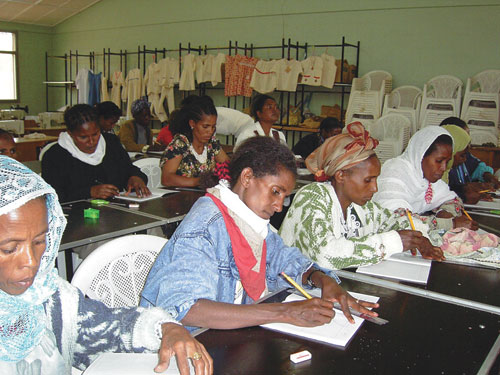
Discharged female soldiers taking a lesson on sewing (Eritrea: Project on Basic Training for Reintegration on Demobilized Soldiers) (Photo: Ms. Yuri Takahashi)
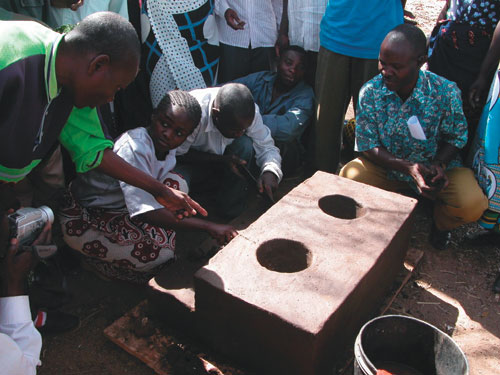
Training in the use of improved heat-efficient furnaces. These are expected to reduce the burden on both men and women regarding household duties
With such changes in the international community in mind, Japan has newly formulated the "Initiative on Gender and Development ( GAD )," having thoroughly reviewed the WID Initiative in the tenth year from the Beijing conference, which was announced at the 49th United Nations Commission on the Status of Women held in March 2005.
The former WID Initiative tended to give the impression that support for women was limited to three priority areas of education, health, and economic and social participation of women. The Initiative on GAD, therefore, places emphasis on reflecting gender perspectives in all areas. It addresses each of the priority issues of the ODA Charter — poverty reduction, sustainable growth, addressing global issues, and peace-building — and specifically exemplifies their relationship with gender issues, as well as modalities of Japan' efforts regarding such issues. Furthermore, for promoting gender mainstreaming 8 in Japan' ODA, the Initiative on GAD presents examples of specific actions to integrate gender perspectives at every phrase of ODA, including policy formation, planning, implementation and evaluation.
The position that focuses on development assistance from gender perspectives is also reflected in "Initiative for Disaster Reduction through ODA" and "Health and Development' Initiative."
Box 3. For Gender Equality and Empowerment of Women: Examples of Japan' Assistance
Box 4. Initiative on GAD (Gender and Development) (Outline)
(3) Health and Development Initiative
In tackling the poverty reduction issue, it is extremely vital to achieve the goals directly related to health, which account for three of the eight MDGs. However, the progress toward achieving the health-related MDGs is lagging in many developing countries.
Based on this recognition, with the completion of the Okinawa Infectious Diseases Initiative ( IDI ), in March 2005, which was announced on the occasion of the Kyushu-Okinawa G8 Summit in 2000, and which considerably exceeds the original goal of US$3 billion in five years (disbursement was over US$4.1 billion by the end of FY2003), Japan formulated the Health and Development Initiative. This initiative places particular emphasis on contributing to the achievement of health-related MDGs and was announced at the High-Level Forum on Health MDGs in Asia and the Pacific, which was held in Tokyo in June 2005.
The basic policy of the Health and Development Initiative is to support the self-help efforts of each country by emphasizing the "human security" perspective and cross-sectoral actions, and in collaboration and coordination with the international community and the development strategies of the developing countries. Its clearly aims to support the achievement of the health-related MDGs, and to improve the health sector not only through efforts that directly contribute to the improvement of health indicators, but also by making use of Japan's experiences to implement cross-sectoral actions and strengthen the health system. Prime Minister Junichiro Koizumi announced that based on this initiative, Japan would provide assistance amounting to a total of US$5 billion over the next five years from 2005 (see Chart18 for IDI disbursements).
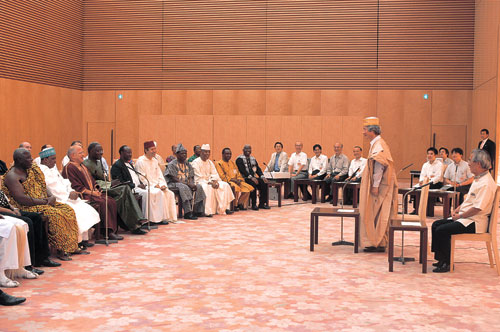
Prime Minister Koizumi announcing the provision of a US$5 billion assistance based on the "Health and Development' Initiative" (Photo: Cabinet Office)
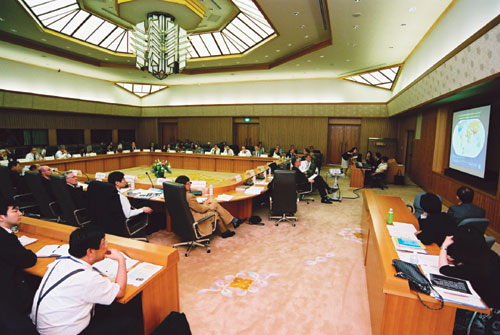
High-Level Forum on the Health MDGs in Asia and the Pacific
Box 5. "Health and Development" Initiative (HDI) (Outline)


 Next Page
Next Page